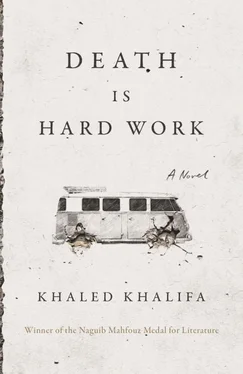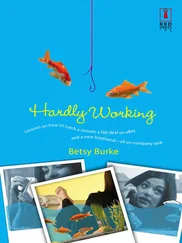She felt him panting like a teenager, and it wasn’t long before he reached for her hand and squeezed it with disconcerting force. She thought it was just an expression of the solidarity called for in such circumstances, but even so she felt a not-entirely-innocent sensation flowing through her veins. He would never find a better opportunity than this to declare the love he felt compelled to reveal. He talked for more than an hour, and Nevine listened without comment—not that he gave her any chance to respond, to correct his interpretation of the facts he related with such confidence; he just stood up when he was finished and walked out. He left the hospital for what remained of his house: a single bedroom and the remnants of the kitchen, whose eastern wall had been destroyed, leaving it open to the garden. He was used to living in these ruins and refused to leave the house; he told his friends, who asked him to move somewhere safer—somewhere with a cellar that might protect him from the aerial bombardment—that whatever remained of his own home was good enough for him. He wouldn’t leave his bed; to do so would make him feel like a stranger to himself. Homesickness always began with leaving one’s bed, he said, and abandoning the little items you use every day that have become a part of you. Leaving these objects behind is extremely difficult and is always a herald of misfortune.
He wasn’t the only man who refused to leave his shell of a home, but even so his determination to stay put seemed incomprehensible. His remaining friends and acquaintances explained it as reluctance to leave his memories of his wife, but the truth was that Abdel Latif didn’t want to leave the place where, for years, he had daydreamed about Nevine. The night of his confession, he slept deeper than he had for years, while Nevine sat alone on her bench in the garden of the field hospital, unable to move. She thought of what Abdel Latif had said and tried to piece together his precise words, the various expressions he had used. She couldn’t remember anything in concrete terms, but she had to admit that the thought of shaking up her life was attractive. She was delighted to discover there were men who had been in love with her for years without speaking a word to her about it; she’d always hated being the country girl afraid of the city who hadn’t felt able to turn down the first suitable offer of marriage. And after accepting, she hadn’t been able to back out; Najib Abdullah never gave her a logical enough reason for retreating from her foolish decision, agreeing to be joined to a man she didn’t love. She hadn’t noticed that life had already presented her with a bouquet floating quickly down the nearby river; she hadn’t seen it until it was too late, when it didn’t mean anything anymore. What was the point of clinging to memories as life went by? They were only good for digging up more pain, she thought.
Abdel Latif didn’t pursue her, exactly, but neither could she forget what he’d said. He was always present nearby, like a moth fluttering around her. He had decided to burn; no more slow living for Abdel Latif—that was what he thought as he saw her furtive looks at him changing every day. He felt surrounded by a wall of time protecting him from frustration and sluggishness. He was confident she wouldn’t let him drown in the whirlpool again. He didn’t know where he found the courage to act so recklessly in the early years of the revolution, doing so many things he used to find horrifying. He opened his wife’s wardrobe, and the smell of moldy clothes wafted in his face. Even now he refused to look inside. He asked a girl who took care of donated goods to cart everything away, and he cleared the house of his wife’s clothes at last. Later he decided that this wasn’t enough; he asked a group of young men to take the whole wardrobe out of the house and dispose of it; some nails in the wall would be enough to hang his few clothes on. If you want to expel someone from your memory, you need to remove their scent from your presence entirely.
He asked himself: What do the martyrs need? Nothing, was his reply, and he went on: Even if they were alive, nothing. He liked the idea of renunciation and asceticism in these times, the same way he liked seeing himself as a living martyr seeking death at every moment, a man who had truly destroyed the walls of fear by reviving a cherished notion: that of the brave man who couldn’t have cared less about that cruelest of all humanity’s fears—death. He kept a vial of poison in his pocket, small but enough for a quick death, and planned to swallow it if he were ever arrested. He wouldn’t give them the pleasure of torturing him. He thought of all the courageous people he had read about in the histories of various other revolutions who had climbed the scaffold without faltering, spitting on their murderers and striding forward into oblivion with total composure and resolution.
Meanwhile, Nevine thought for a long time about all she had left: nothing but graves. Once again, she was an outsider longing for her childhood home. Her sons’ friends tried to alleviate her loneliness, but how to carry on living was the greater problem. Basically, there was no one left; at night the town was completely desolate. A few thousand people still clung on, but they couldn’t go outside after curfew. Few houses had completely escaped destruction, and the town had become communal property; what remained wouldn’t sustain anyone for more than a few weeks. Supplies were exhausted; animals were dead; water pipes and electric wires were completely destroyed. Everyone was thinking up other ways of surviving, with never a moment free from considering the question of how to keep clinging on to life. They had to dig up old wells, remember the old ways of storing the beans that grew wild around the edges of the nearby meadows. Reaching the distant fields full of produce had become impossible; regime troops had closed off all the entrances and exits to the town, and four large military campaigns had allowed them to occupy observation posts and embed large groups of snipers around the place who kept watch over every possible—and impossible—way of reaching the fields.
Everyone wanted to smash their mirrors. It was hard enough looking at other people’s faces without feeling miserable, let alone one’s own. They had heard about starvation from books and fairy tales, but now they were experiencing it for themselves, along with selfishness and a new lust for survival. People fought fiercely over a handful of herbs and a few wild mushrooms. Everything had changed in the small town, and what had been normality a few months earlier now became unimaginable. Abdel Latif walked the empty streets among the destroyed houses, looking for some scrap of food that might have been forgotten, a few handfuls of bulgur wheat or rice, a little corn or olive oil, the remains of some ground lentils, but he never found anything, as others had been there before him. He spent hours combing through the rubble, walking through nearby scrubland looking for anything edible: rabbit, dog, cat—anything would do, and everything had become acceptable. People slaughtered dogs and invented new recipes for them; they drove cats out of every corner. Many people died of starvation. He didn’t want to go home empty-handed; the sweetheart waiting for him there was withering away with each passing day. Their late-woken feelings helped them both to find their innocence once again; they knew all the phases of the moon and kept watch for each.
Because Nevine hadn’t kept him waiting long. She said that she didn’t want to spend the rest of her life alone. Abdel Latif understood her well enough.
That day was in the winter of 2013, two weeks before Christmas. Abdel Latif had been to the church earlier in the afternoon—it had been substantially destroyed in the last bombardment. Father Walim had been one of the last Christians to leave before the siege finally closed around the town, and he had charged Abdel Latif with looking after what remained of the church, reassuring him that the archbishop had already moved all the manuscripts and icons to an unknown location in Lebanon. Abdel Latif understood him well enough, too: he had to care for the soul of the place—that was his task. So every now and then he would go there and wander around the rubble. Only a small part of the large hall was still standing, and in the middle of it a door led to a narrow room holding priests’ robes and some small bottles of oil. Abdel Latif was astonished that these had been left untouched; the looters hadn’t spared anything else—not even the huge bell this church and all the other churches in the area used to boast of. Syrian ironmongers had made it especially for a church in Antakya, but they were so proud of their craftsmanship they didn’t want to see it hanging so far away, and so they hid it instead. A few years later they gifted it to the church in S, where they could enjoy its peals every Sunday.
Читать дальше












